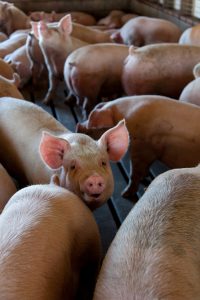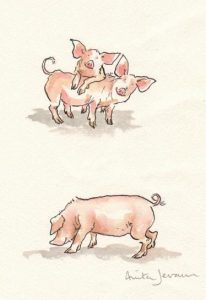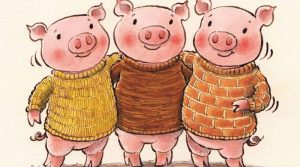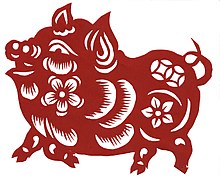You may know from previous blog and FB posts that I’m enrolled in a class on nature writing. As a result, I’m even more aware of nature around me—of plants, birds, and squirrels in particular. But I’ve also been reading more about nature—particularly plants and animals, but I may move on to weather or geology at some point. But tonight, let’s talk pigs.
I grew up in farm country, with friends in 4-H who took their project pigs to the county fair, and uncles who butchered hogs on their farms. But most of us grew up hearing pig doggerel:
To market, to market
To buy a fat pig.
Home again, home again
Jiggedy jig.
To market to market
To buy a fat hog.
Home again, home again,
Jiggedy jog.
This little piggy went to market.
This little piggy stayed home.
This little piggy ate roast beef.
This little piggy had none.
And this little piggy went wee, wee, wee
All the way home.
Virtually everyone knows the story of “The Three Little Pigs.” If not that classic, there is always Porky Pig, and even more recently, Miss Piggy—who is cited as saying, “Never eat more than you can lift.”
Pigs have been all things to all people throughout history.
From the 11th through 13th centuries, the sow and the boar were symbols of all sorts of vices in the Bestiaries, collections of fables involving animals meant to provide morality themes for sermons, or personal reflection. Pigs in 16th century art often represented sins of the flesh.
Pigs as unclean: both Islam and traditional Judaism forbid eating pork. Hindus eat no pork, while Sikhs eat very little pork.
The contradictory roles of pigs in Greek mythology is beautifully illustrated by the legend that a sow was supposed to have suckled Zeus and a wild boar killed him. In ancient Egypt a pig represented the spirit of Osiris when crops were planted and the spirit of Seth when they were harvested. Nevertheless, they were considered unclean, and drinking pig milk was thought to cause leprosy. Tantric Buddhists worship Marici the Diamond Sow. The Kaulong section of Papua New Guinea is a pig culture—which is fascinating, and too much to go into here, but there is a saying there: “Pigs are our hearts.”
On the positive side: 2019 is the year of the pig in the Chinese zodiac. It comes around every twelve years. In 2007, it was the Year of the Golden Pig, especially auspicious because a Golden Pig year comes only once in every sixty years. The personality of Pigs is supposed to be kind and understanding, an able peacemaker. Pigs are excellent conversationalists, truthful and to the point. A Pig believes in justice and law and order, rejects all falsehood or hypocrisy.
Pigs for sport.
- Greezed pig contests
- Pig races at the Michigan Spree Festival
Random facts:
- Pigs are the most ancient of nonruminant mammals, existing forty million years ago—long before humans.
- Pigs exist in one form or another in every part of the world.
- In three months, three weeks, and three days, a sow can produce a litter of eight piglets. With competent treatment, they can be ready for market in six months.
- Toothbrushes were invented in China and originally used boar bristles; today, industrial and consumer products are practically limitless, from plywood adhesive and dye to glue and bone china.
- Beyond bacon: because of similarities to humans, pig heart valves, insulin, and porcine bur dressings. These are just examples of pharmaceutical uses, which rank second only to meat in importance.
- You can’t sweat like a pig because pigs don’t sweat.
- Pigs put on one pound of weight for every three pounds of feed they consume.
- If there is an option, pigs do not wallow in their own waste.
- Pigs can be housebroken.
Pigs in phrase and fable:
- don’t cast pearls before swine
- don’t buy a pig in a poke
- can’t make a silk purse from a swine’s ear
- graceful as a hog on ice
- hogging the (x)
- eat like a pig
- eating high on the hog
- living high on the hog
- sweat like a pig (see above)
- pig out
- going whole hog
- going hog wild
- looks like a marzipan pig (i.e., prosperous)
- fat as a pig
- happy as a hog in shit
- in a pig’s eye
- piggy bank
- piggyback
- hogging the road
- pigs get fat and hogs get slaughtered
- being a porker
Bottom line: Pigs are ubiquitous. Is there a place for pigs in your writing?






